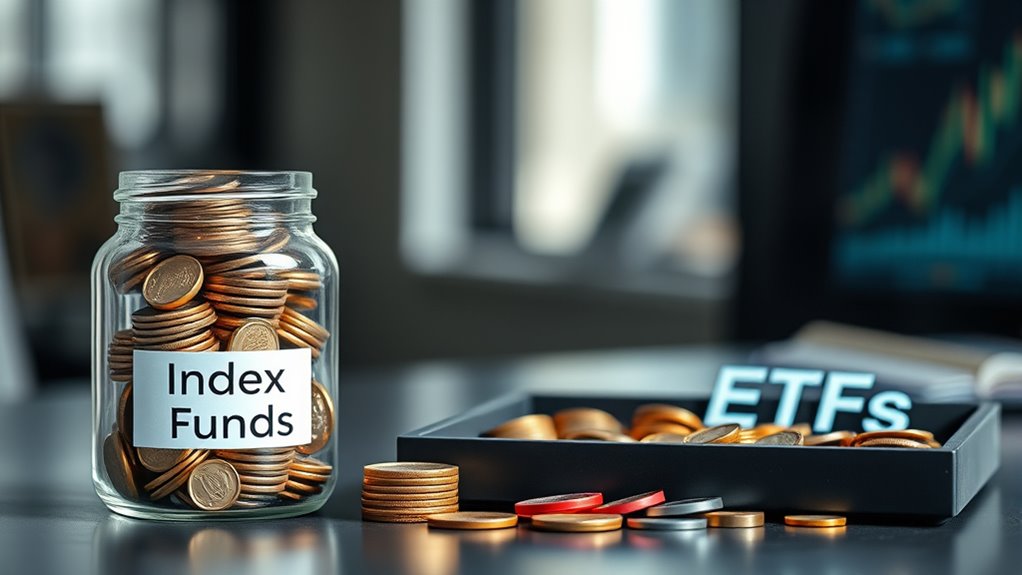Both index funds and ETFs offer low-cost, passive investment options that track specific market indexes and provide diversified exposure. Index funds are best for long-term, buy-and-hold investors because they are purchased at end-of-day prices and lack trading flexibility. ETFs, on the other hand, trade intraday like stocks, offering more control and tax efficiency. To make the best choice for your goals, understanding their key differences is essential—keep exploring to get the full picture.
Key Takeaways
- Both are low-cost, passive investment options tracking specific indices, suitable for long-term investing.
- ETFs offer intraday trading, more flexibility, and potentially greater tax efficiency than index funds.
- Index funds are purchased at end-of-day NAV and are better for buy-and-hold strategies without frequent trading.
- ETFs allow for active trading strategies, limit orders, and quick responses to market movements.
- Choice depends on investor goals: passive, long-term growth favors index funds; active trading and tax considerations favor ETFs.

Are index funds and ETFs really that different, or are they just two sides of the same coin? At first glance, they seem similar—both are low-cost investment options that track a specific index. But dig a little deeper, and you’ll find key distinctions that can influence your trading strategies and tax implications. Understanding these differences helps you make smarter choices aligned with your financial goals.
When it comes to tax implications, the way you buy and sell shares in index funds versus ETFs can profoundly impact your tax bill. With index funds, you buy directly from the fund company, and when you sell, it’s a taxable event. If the fund manager has to sell assets to meet redemptions, it may generate capital gains, which are passed on to you, even if you didn’t sell any shares yourself. This can lead to unexpected tax liabilities, especially in actively managed funds or during market downturns. Conversely, ETFs are structured differently. They use an in-kind creation and redemption process, which allows them to minimize capital gains distributions. As a result, ETFs often produce fewer taxable events, making them more tax-efficient for investors who want to hold for the long term or frequently rebalance their portfolios. Additionally, the highly liquid trading of ETFs provides more control over the timing of your trades, which can be advantageous for tax planning.
Your trading strategies also differ between the two. Index funds are best suited for buy-and-hold investors because they are purchased at the end of the trading day at the fund’s net asset value (NAV). The trading process is straightforward but doesn’t lend itself well to short-term trading or quick moves. ETFs, however, trade throughout the day on stock exchanges like individual stocks, giving you more flexibility. You can place limit orders, stop-losses, or engage in intraday trading strategies, which can be advantageous if you’re actively managing your investments or trying to capitalize on short-term market movements. But keep in mind, this active trading can lead to higher transaction costs and tax considerations if you’re frequently buying and selling.
Frequently Asked Questions
Can Investors Switch Between Index Funds and ETFS Easily?
You can switch between index funds and ETFs easily because of their liquidity flexibility. ETFs are traded like stocks, so you can buy or sell anytime during trading hours, often with low trading costs. Index funds, on the other hand, are bought or sold at the end of the day at their net asset value. Understanding these differences helps you choose the right option based on your trading preferences and costs.
Which Option Has Better Tax Efficiency for Investors?
Imagine your investments are like a garden—some plants grow quietly without much fuss. ETFs often have better tax efficiency because they typically allow for in-kind redemptions, reducing taxable capital gains. Index funds, on the other hand, might trigger more capital gains due to fund sales. So, if you want fewer tax implications and capital gains, ETFs are generally the smarter choice for minimizing tax surprises.
Are There Specific Scenarios Where One Outperforms the Other?
You’ll find that during market volatility, ETFs often outperform index funds because of their liquidity considerations, allowing you to buy or sell shares quickly. Conversely, index funds might excel in stable markets when you prefer a straightforward, set-it-and-forget-it approach. If you’re concerned about tax efficiency in specific scenarios, understanding how each handles capital gains during fluctuating markets helps you choose wisely.
How Do Dividend Reinvestment Policies Differ Between the Two?
You’ll find that dividend policies and reinvestment strategies differ between index funds and ETFs. Index funds typically reinvest dividends automatically, offering a set reinvestment strategy that simplifies compounding. ETFs often give you the choice, allowing you to reinvest dividends manually or via a dividend reinvestment plan (DRIP). This flexibility means you can tailor your reinvestment strategies to match your financial goals more precisely.
What Are the Best Practices for Choosing Between Index Funds and ETFS?
When choosing between index funds and ETFs, you should consider your fund selection and investment goals. Think about whether you prefer the flexibility of buying and selling throughout the day with ETFs or the simplicity and automatic reinvestment of index funds. Your decision depends on your risk tolerance, cost sensitivity, and how actively you want to manage your investments. Align your choice with your long-term financial objectives for the best results.
Conclusion
Choosing between index funds and ETFs boils down to your investment style, but remember, the right choice can make or break your financial future. Think of it like a race—you’re the runner, and fees are the hurdles. Do you want to clear them effortlessly with low-cost options? Whether you pick the steady stride of index funds or the nimble moves of ETFs, your smart decision today sets the course for tomorrow. Don’t just invest—invest wisely.









